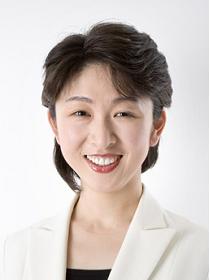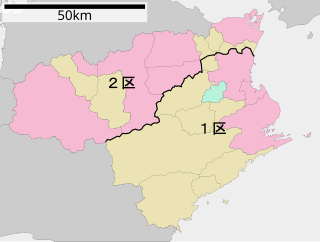This article needs additional citations for verification .(August 2019) |
A gubernatorial election was held on 7 April 2019 to elect the next governor of Tokushima.
This article needs additional citations for verification .(August 2019) |
A gubernatorial election was held on 7 April 2019 to elect the next governor of Tokushima.
| Party | Candidate | Votes | % | ±% | |
|---|---|---|---|---|---|
| Liberal Democratic | Kamon Iizumi | 158.972 [2] | 52.98 | − 27.27 | |
| Liberal Democratic | Taiji Kishimoto | 120.276 | 40.92 | n/a | |
| Communist | Atsushi Amou | 18 332 | 6.11 | − 13.64 | |
| Turnout | 303,903 | 48.34 | + 7.71 | ||
| Registered electors | 628,726 | ||||
| Liberal Democratic hold | Swing | n/a | |||

Politics of Japan are conducted in a framework of a dominant-party bicameral parliamentary constitutional monarchy, in which the Emperor is the head of state and the Prime Minister is the head of government and the head of the Cabinet, which directs the executive branch.

Komeito, formerly New Komeito and abbreviated NKP, is a political party in Japan founded by members of the Buddhist movement Soka Gakkai in 1964. It is generally considered as centrist and conservative. Since 2012, it has served in government as the junior coalition partner of the nationalist and conservative governments led by the Liberal Democratic Party.

The Liberal Democratic Party, frequently abbreviated to LDP or Jimintō (自民党), is a major conservative and Japanese nationalist political party in Japan.

The Japanese political process has two types of elections.

The New South Wales Liberal Party, officially called The Liberal Party of Australia, New South Wales Division, and colloquially known as the NSW Liberals, is the state division of the Liberal Party of Australia in New South Wales. The party is currently in Opposition in New South Wales in a coalition with the National Party. The party is part of the federal Liberal Party.

This article presents detail of the results in the 2005 Japan general election, breaking down results by block district. The 11 block districts elected 180 members by proportional representation, and 300 members were elected from single-member districts distributed among the 47 prefectures.

Miho Takai is a Japanese politician. She served in the House of Representatives in the Diet as a member of the Democratic Party of Japan.

Kamon Iizumi is a Japanese politician and a former governor of Tokushima Prefecture. A native of Ikeda, Osaka and graduate of the University of Tokyo, he worked at the Ministry of Home Affairs from 1984. Iizumi was elected as a Governor of Tokushima Prefecture in 2003 and served for 5 terms. Iizumi ran for 6th term in 2023, despite LDP officials wanting him to retire. Iizumi ended up third in the elections, receiving 26% of the vote.

Tokushima 1st district (徳島県第1区) is a constituency of the House of Representatives in the Diet of Japan, located in Tokushima Prefecture on the island of Shikoku.

House of Councillors elections were held in Japan on July 11, 2010. In the previous elections in 2007 the Liberal Democratic Party (LDP) had lost its majority to the Democratic Party (DPJ), which managed to gain the largest margin since its formation in 1996. The House of Councillors is elected by halves to six-year terms. The seats up for election in 2010 were last contested in the 2004 election.
Tokushima at-large district was a constituency of the House of Councillors in the Diet of Japan. It consists of Tokushima Prefecture and elects two Councillors, one every three years by a first-past-the-post system for a six-year term. In the first election in 1947, Tokushima like all districts used single non-transferable vote to elect both its Councillors in one election.
The 17th unified local elections in Japan took place in April 2011. In the first phase on April 10, 2011, 12 governors, 41 prefectural assemblies as well as five mayors and 15 assemblies in cities designated by government ordinance were elected. In the second phase on April 24, 2011, mayors and assemblies in hundreds of cities, "special wards" of Tokyo, towns, and villages were up for election. Additionally, a by-election for the National Diet was held in Aichi on April 24.

House of Councillors elections were held in Japan on 7 July 1974, electing half the seats in the House. The Liberal Democratic Party won the most seats.
The 16th unified local elections in Japan took place in April 2007. In the first phase on April 8, 2007 13 governors, 44 prefectural assemblies as well as four mayors and 15 assemblies in cities designated by government ordinance were elected. In the second phase on April 22, 2007 mayors and/or assemblies in hundreds of cities, special wards, towns and villages were up for election. Additionally, by-elections for the national Diet were held in Fukushima and Okinawa on April 22.

General elections were held in Japan on 14 December 2014. Voting took place in all Representatives constituencies of Japan including proportional blocks to elect the members of the House of Representatives, the lower house of the National Diet of Japan. As the cabinet resigns in the first post-election Diet session after a general House of Representatives election, the lower house election also led to a new election of the prime minister in the Diet, won by incumbent Shinzō Abe, and the appointment of a new cabinet. The voter turnout in this election remains the lowest in Japanese history.
The first stage of the 18th unified local elections in Japan took place on April 12, 2015. The Liberal Democratic Party under leadership of Shinzo Abe was the overall victor, winning many races including all ten gubernatorial races and 1,153 of the 2,284 assembly seats at stake. Further elections for municipal mayors and assemblies took place on April 26.

House of Councillors elections were held in Japan on 21 July 2019 to elect 124 of the 245 members of the House of Councillors, the upper house of the then 710-member bicameral National Diet, for a term of six years.

Masaharu Gotōda was a Japanese bureaucrat and politician of the Liberal Democratic Party who served as Deputy Prime Minister of Japan in 1993. He also several in several other cabinet positions such as Chief Cabinet Secretary from 1982 to 1983 and 1985 to 1987 under Prime Minister Yasuhiro Nakasone and Minister of Justice from 1992 to 1993 under Prime Minister Kiichi Miyazawa.

The 2021 Japanese general election in Shikoku were held on October 31, 2021, to elect the 17 representatives, one from each of 11 Electoral districts and 6 proportional seats.